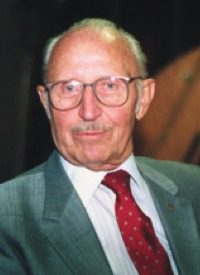
Vilius Brazenas, a native Lithuanian, was on the frontlines of the freedom fight for the span of several generations and resisted both Nazi and Communist oppression of his homeland. This Interview of Brazenas by William F. Jasper originally appeared in The New American on August 14, 2000. It is being reprinted in tribute to his recent passing on October 3, at the age of 97.
Vilius Brazenas has been an eyewitness to and a participant in some of the most momentous struggles of the 20th century. Having lived through World War I, the Bolshevik Revolution, and the occupation and devastation of his native Lithuania by both Communist and Nazi aggressors, he has been a passionate champion of freedom for seven decades. Mr. Brazenas, who emigrated to the United States in 1949, studied engineering and is a journalist and author of three books published in Lithuanian. He served for many years as chairman of the Lithuanian Freedom Forum in Florida and was also a vice president of the Supreme Committee for the Liberation of Lithuania, which was formed underground during the Nazi occupation and later became the primary organization in exile fighting for a free Lithuania. He has appeared on hundreds of radio and television programs, and for many years was a speaker for the John Birch Society.
Q. You recently returned from a visit to Lithuania, where an important and historic event took place. Tell us about it.
A. I arrived in Lithuania on June 7th, just prior to the convening of the International Congress on the Evaluation of Crimes of Communism on June 12th-14th, in the Great Hall of Parliament in Vilnius, the capital of Lithuania. The Congress was organized by groups representing survivors of the Soviet Gulag, resistance organizations, and academics. It brought together delegates from 22 nations, including Lithuania, Latvia, Estonia, the Czech Republic, Russia, Belarus, Bulgaria, Poland, Germany, Ukraine, Croatia, Romania, and the United States. This was an important event because, after more than a decade since the supposed collapse of Communism, there has still been no justice for the tens of millions of victims who perished under the bloody heel of Communism, and for the many tens of millions of victims who survived but have suffered terribly. As Dr. Ariel Cohen of the United States pointed out in his testimony, only two years after World War II, Nazism was officially denounced, the top Nazi leadership was tried, convicted, and then executed, and Nazis were tracked down all over the world. They still are being hunted more than half a century later. Meanwhile, throughout the former Soviet Union and the former Captive Nations of Central and Eastern Europe, the same bloody-handed Communist officials who oppressed and tortured millions of people are still holding political office, only now they have been transformed into “reformers” and “nationalists,” or they have become the new elite business class, reaping huge profits with their Western corporate partners.
The International Congress on the Evaluation of Crimes of Communism voted to establish a Tribunal, composed of three justices, for now, but more could be added later. The Tribunal began hearing the testimony of witnesses and victims, and that is continuing now.
Q. Who were some of the witnesses?
A. From the United States, in addition to Dr. Cohen, previously mentioned, testimony was heard from Mr. Herbert Romerstein, a former staff member of the House Committee on Internal Security and the United States Information Agency, and a specialist on the Soviet KGB, as well as from Mr. Avo Piirisild and Ms. Tatiana Yankelevich. They heard also from Senator C.T. Dumitrescu of Romania, Professor Radim Harecki of the Belarus Academy of Sciences, Mr. Agim Musta of Albania, and Archbishop Sigitas Tamkevicius of Lithuania, to name just a few. Also, there was a witness whom some of your readers may remember: Monsignor Alfonsas Svarinskas, a Catholic priest who was released in 1988 after having heroically spent more than one third of his life in the prisons of the Soviet Union. He was interviewed by The New American in July 1989, during his tour of the United States.
Q. There have been no reports, to my knowledge, of this Congress and Tribunal in the U.S. media.
A. Yes, and that is unfortunate, but not surprising. Like millions of Lithuanians and other Europeans, I have lived under both Nazi and Communist oppression. The Nazis, remember, were national socialists, the National Socialist Workers Party; the Communists are international socialists. They are both driven by similar socialist, godless ideologies and have produced murderous, totalitarian regimes that committed innumerable crimes. The perpetrators of these crimes must be brought to justice. Western powers since World War II have carried out extensive efforts to prosecute Nazi criminals, going sometimes to extreme lengths and accepting bogus evidence provided by the Soviet KGB. But they have not shown any similar fervor toward prosecuting the Communist criminals.
Likewise, the Western media and Hollywood have relentlessly reminded us of the evils of Nazism; they have produced hundreds of films, television dramas, and documentaries on the Nazi atrocities, but almost none on the even greater crimes and atrocities of Communism. In fact, Hollywood and the Western media have, more frequently than not, covered up for, apologized for, romanticized, and glorified Communist tyrants. Everyone now knows that Hitler and the Nazis were evil, but only a very small percentage of Americans knows anything specific about the terrible crimes and genocide of Stalin, Mao, Ho Chi Minh, Fidel Castro, etc.
Q. Did the new president of Lithuania, Valdas Adamkus, attend the Congress?
A. No, and his absence was very conspicuous and telling. Mr. Adamkus, a former bigwig in the U.S. Environmental Protection Agency, went to Lithuania, and with the help of “liberal” Lithuanian groups in the U.S., and with the blessings of the U.S. Establishment, captured the Presidency. You might recall that right after Lithuania declared its independence, Mr. Vytautus Landsbergis, as chairman of the Parliament, became president. But he went to New York and spoke to the CFR [Council on Foreign Relations] and made it clear that he was for genuine independence for Lithuania, so that sealed his fate, in my opinion. In contrast, according to a news item in a Lithuanian-language U.S. newspaper, Mr. Adamkus had risen high within the EPA because he had been taken under wing by Elliott Richardson, a major CFR internationalist.
In September 1998, Daniel P. Fata, a research associate with the CFR, wrote an article for the Washington Times entitled “Hope in the Baltics,” which has a very important bearing on all of this. Mr. Fata said that the main concern of Americans regarding the Baltics is the crimes against Jews during World War II. He noted that the Baltic presidents had agreed with the governments of France, Israel, and the U.S. to look at crimes from 1941 to the end of the Cold War. Now, the choice of this time period was very deliberately made to exclude the Communist atrocities that began with the Soviet occupation of 1940. On August 23, 1939 the two dictators of Europe, Hitler and Stalin, made a secret agreement, the Molotov-Ribbentrop accord, in which they divided up Eastern Europe. On June 15, 1940, the three free Baltic Republics were brutally occupied by the Soviet Army.
Q. The Soviets deported huge numbers of the Baltic peoples to the Soviet Union during that time, didn’t they?
A. Lithuania, counting those who fled from the Soviets in 1944, lost one-third of its population, about 800,000 people. Most of them went to slave labor camps and never came back. They were worked to death, starved, and frozen to death. My wife’s grandmother, for instance, who was in her ’70s, was sent to be a lumberjack, doing heavy labor cutting and hauling wood in the snow. It was a death sentence, of course. While the native Baltic peoples were being systematically removed, Russians were being moved in to take their places. After World War II, the Baltics and Eastern and Central Europe were betrayed by the West and turned over to Stalin. During the late 1940s, the mass deportations started again, in response to the 10-year war of resistance fought by Lithuanian freedom fighters. Farmers were deported so that they could not aid the guerrillas. Many people were deported simply because their strong religious faith was seen as a threat to the Communist plan for the Baltics. Again, more Russians were brought in to replace the deportees. As a result, about 9 percent of Lithuania’s population is Russian. Latvia and Estonia are far worse in that respect, being about 50 percent Russian. All during the Cold War and Soviet occupation, the Baltic states were a favorite retirement place for Red Army officers and members of the nomenklatura.
However, the CFR elite, which has a predominant influence in American political and media circles, has intentionally focused exclusively on the Nazi villains and ignored – and actually covered up – Communist villainy. You don’t have to take my word for it; the CFR admits this in its own journal, Foreign Affairs. I’m referring specifically to an article entitled “The Fall and Rise of the Communists: Guess Who’s Running Central Europe?” by Anne Applebaum in the November/December 1994 issue of Foreign Affairs. Ms. Applebaum noted that in 1993 and 1994 an amazing thing had happened throughout Central Europe: Former Communists – calling themselves Social Democrats, Nationalists, and reformers – were swept to power in parliamentary and presidential elections. Genuine nationalists and anti-Communists were defeated. Why was this? Ms. Applebaum explained:
Western, particularly American, diplomats in Central Europe went out of their way to encourage politicians they perceived as antinationalist and to discourage “decommunization” programs, which were often favored by politicians whom they perceived as nationalist. This was the case across the former Soviet bloc, even though decommunization projects, sometimes called “lustration,” usually did little more than forbid former high-ranking communist party officials from holding office under the new regime…. Right-wing and conservative politicians in Central Europe failed to receive the official approval, invitations, and fellowships given their left and center-left counterparts.
“In Central Europe,” Applebaum stated, “the greatest danger to democracy and stability does not – and never did – come from the new or old nationalist right. The danger comes from the old left, from the remnants of the communist parties, which remain better organized and better funded than any new right-wing party could ever be. Former communist parties hold political and economic monopolies that will take years to loosen; until they do, politics will not become ‘normal’ in any Western sense in Central Europe or elsewhere in the former Warsaw Pact.” She further points out that a “Polish economist who traced the careers of several hundred top nomenklatura from 1988 to 1993 found that over half of them turned up as top executives in the private sector. Those numbers were even higher in Hungary and higher still in Russia.”
This, of course, is not news to many of your readers, since The New York Times has chronicled these treacherous policies in detail over the past decade, but most Americans are not aware of this. Applebaum says that these policies were “a mistake.” I don’t believe they were a mistake, any more than the betrayal at Yalta was “a mistake” – they were, and are, policies of deliberate betrayal. But even if you were to grant Applebaum’s “mistake” thesis back in 1994, how can you accept the same excuse for the continuation of those same policies by the CFR policy elite ever since?
Q. That would include people like billionaire George Soros.
A. Yes. Soros, a CFR member, has poured millions of dollars into the Soviet-bloc countries, always supporting the “former” Communists. The Washington Post, New York Times, and other CFR organs like to praise these efforts and invariably refer to the Soros-backed people as “reformers,” but never point out their Communist backgrounds.
Q. One of the frequent ploys used to thwart and discredit efforts by those seeking justice for the crimes of Communism is to claim that they are anti-Semites or neo-Nazis.
A. That is an old Communist tactic; the Communists and their dupes and allies have always tried to keep the world’s attention focused on the crimes of Hitler, so that they could continue their own criminal operations unhindered. And they have been very successful at it. I have always said that there are good and bad in every group and every race and nationality. There were Lithuanians who helped the Nazis, just as there were Lithuanians who helped the Communists. There were Lithuanian anti-Semites, just as there are racists and anti-Semites in many other European countries. However, they have always constituted a small minority, just as they do here in the United States. It is a terrible smear of the Lithuanian, Latvian, Polish, Czech, Hungarian, and other people – who suffered terribly under Hitler — to dismiss their concerns with Communism as “anti-Semitism.” Many of these people risked their lives to assist Jews during the Nazi occupation. Lithuania is primarily a Catholic country, and the Communists tried very hard to destroy the people’s religious faith, but they failed. There, as elsewhere, the Communists have been in the forefront of promoting anti-Semitism because they know it effectively neutralizes and discredits anti-Communist efforts, and diverts attention from Communist crimes and oppression.
But the Nazis weren’t the only ones to persecute Jews; it should be remembered that Jews were also victims under the Soviet occupation. During 1940, the Soviets were deporting Jews from Lithuania too, and at a higher rate (for their percentage of the population) than those who were not Jewish.
Q. Isn’t there a danger that the international Tribunal you are supporting could be exploited or hijacked to support things like the UN’s proposed International Criminal Court (ICC) and other juridical monstrosities that present a real threat to national sovereignty?
A. That is possible, but not likely. For one thing, the UN internationalists have never been interested in prosecuting Communists. For another, the Tribunal, unlike the ICC and the UN’s so-called tribunals in Yugoslavia and Rwanda, claims no judicial authority. It seeks to operate in the court of public opinion. It is an attempt to educate, to bring to the surface the facts, the witnesses, the truth, that have been buried. This will bring about understanding, which, in turn, can generate the will to see that justice is served, not through some UN apparatus, but through the laws and the legal systems of sovereign nations. Lithuania is perfectly competent to prosecute Communist criminals, as is Germany, Ukraine, Latvia, Poland, etc. — without the UN or the U.S. State Department.
Q. You spent part of your childhood in Russia during the Bolshevik Revolution. How did that come about?
A. I was born in Riga, Latvia, in 1913, at a time when the Baltic States — Lithuania, Latvia, and Estonia — were under the control of Czarist Russia. My parents were Lithuanian, but my family had moved to Latvia, where my father had found employment in a rubber factory. In 1915, with World War I raging, Russia moved many factories from the Baltics to Russia, and my family, like many others, went with the factories. After the Bolsheviks came to power, in 1917, we tried to return to Lithuania, but that was a very difficult thing to do, because of the revolution, war, famine, and turmoil. My father died in 1919, and I, along with my mother and sister were trapped in Moscow. On May 1, 1922, at age nine, I and my school classmates were forced to march in the big Communist celebration in Red Square for V.I. Lenin. In June of 1922, my family finally returned to Lithuania.
Q. You have lived a long time and have seen and experienced incredible brutality and evil. Are you pessimistic or optimistic as you look at the efforts of the Tribunal underway in Lithuania and the other efforts with which you are involved?
A. As a Christian, my Faith does not allow me to be pessimistic; in the end, I know that God’s justice and truth will prevail. And I know that He expects us to be faithful, and never to give up. In addition, I am optimistic because I see a level of understanding — particularly concerning the plans for the new world order, for world government, for “convergence” of East and West – that didn’t exist a generation ago. People are awaking to this danger. It is true that there is still insufficient understanding and far too much confusion, but we now have the means to reach far more people with the truth than ever before – with books, magazines, articles, pamphlets, radio, video, the Internet. What you have done and are doing in this respect with The New American and the other educational efforts of The John Birch Society are wonderful examples of reasons to be optimistic. I’ve been in the freedom fight a fairly long time, but I’m not about to give up.
Related article:
An article by Vilius Brazenas published in the September 6, 2004 issue of The New American
Photo: Vilius Brazenas



